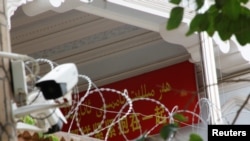The Chinese authorities are using a “mass surveillance” app to profile, investigate, and detain Muslims in the northwestern region of Xinjiang, Human Rights Watch (HRW) says.
The New York-based watchdog said on May 2 that the mobile app is being used to "collect a wide array of information from ordinary people in Xinjiang," ranging from their blood type and height to their “religious atmosphere” and political affiliation.
The tool monitors people’s movements by tracing their phones, vehicles, and ID cards, and notes “suspicious” behavior like whether an individual fails to socialize with their neighbors or uses an “unusual” amount of electricity, according to HRW.
Police in Xinjiang “are using illegally gathered information about people's completely lawful behavior and using it against them," said Maya Wang, HRW's senior researcher on China.
Wang added that the Chinese government “is monitoring every aspect of people's lives in Xinjiang, picking out those it mistrusts, and subjecting them to extra scrutiny."
There are 13 million Uyghurs and members of other indigenous mainly Muslim ethnic groups in Xinjiang.
China has come under intense criticism for putting some 1 million of them in "reeducation centers" that rights activists say are mass internment camps -- an accusation Beijing denies.
Kazakhs are the second-largest indigenous community in Xinjiang after Uyghurs, and the region is also home to ethnic Kyrgyz, Tajiks, and Hui, also known as Dungans.














